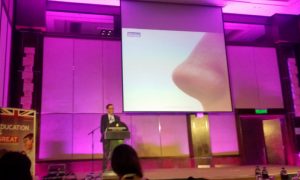More and More: What Parents Really Want from Schools
This is a tale of two noses.
The first nose belongs to a friend and colleague who’s been involved in education for more than 20 years. He’s a teacher and consultant who’s worked with numerous schools around the world to help improve their performance. In the early days running WhichSchoolAdvisor.com I sought his counsel on a number of issues. One question I asked was: ‘So how do you know a good school from a poor school, a school that is doing well from one that’s in trouble?’ He touched his nose. ‘This, James, this tells me.’
He said that as soon as he entered a school he could smell, literally smell, whether a school was in need of his help.
Interesting.
Well in the absence of such a well-developed probiscus my fellow co-founder, David and I, had to turn to the more mundane expedients of eyes, ears and mouth. We sought out publicly available data which included inspection data from regulators and other accrediting bodies, we scanned school websites, we spoke to parents, teachers and students. We listened a lot and we also asked a lot of questions. Schools were naturally wary – so who are these guys? What right do they have to poke their, ah, noses into our school was probably what they thought but were much too polite to say to us.
Our hunch, an educated hunch but a hunch nonetheless that parents were eager for informed, well-researched, unbiased information about schools began to pay off. Our audience of parents grew and so each day as happens in any relationship we got to know them better.
We got to know what they loved about schools.
We got to know what they weren’t so keen on about their schools
We got to know what they would like their schools to do more of
According to the World Migration Report Dubai is the most cosmopolitan city in the world with 83 percent of the population being foreign born. More than 200 nationalities have made the city their home. There are currently 185 private schools with 19 curricula. Yes let me state that again 19 curricula available to parents. Like Dubai itself the school scene there presents an opportunity for experimentation on a grand scale.
The biggest issue facing parents – a squeeze on availability – has been solved in the last three years with a quickening in the pace of arrival of new schools. 15 alone were launched last September. ‘Competition’ is a new word in the Dubai parent’s lexicon.
So all is rosy in the garden then? Well, not quite.
If you want to know what the sudden appearance of choice does to people pick up a copy of ‘The Paradox of Choice – Why More is Less’ by the American psychologist Barry Schwartz. He introduces the concept of ‘voluntary simplicity’ whose core ideas is that we have too many choices, too many decisions, too little time to do what is really important. So a substantial percentage of parents now visiting our site are looking for confirmation that they’ve made the right choice. We’re difficult to please, us humans!
Also the world has changed substantially in the last five years. Facebook groups, class WhatsApp groups were but a dot on the communications horizon then. Now they’re front and centre when it comes to parent communication within a school. The change has been swift and relentless.
So how have most schools dealt with this change? With their usual rapidity, I’d say, which is not very rapidly at all.
The typical way in which schools would approach communication in times past was via a registrar. This person was usually a parent from the school who was a competent administrator and was given the rather overwhelming job of managing applications to the school from parents. No training was given and having spoken to many registrars over the last five years they saw their role as a buffer between school management and parents. These Gatekeepers could be friendly or fierce, open or impossible to track down but one thing was clear. You could not pass without their permission.
But technology and the internet has changed all that. As we know social media can very quickly become anti-social media. Internet forums were alive with the chatter of grumbles, real and perceived that were formerly confined to the four walls of a coffee shop. Tales of hurts and humiliations moved onto closed class WhatsApp groups, open and closed Facebook pages.
Schools suddenly seemed vulnerable so what could they do? Well for many the arrival of social media led to the unleashing of their carefully caged authoritarian streak – ‘we’re banning Facebook groups, no more WhatsApp class groups.
Brilliant.
They may as well have sent school branded gags to all of the parents and asked them to put them on when bringing their child to school. I was reminded of those ‘as useful as’ jokes from my childhood. ‘As useful as a chocolate teapot’, ‘as useful as an ashtray on a motorbike’.
As someone who’s been involved in helping organisations and individuals communicate effectively for more than thirty years I have to say that my experience working in the education sector for the last five years has been enlightening. There is an innate conservatism, a feeling that ‘well this is the way that we do things around here and this is the way it will stay’. But there’s also a general unwillingness to share information. Of the more than 400 private schools in the UAE whom we asked last September to provide information on their exam results in a format that we believe is fair and allows as close as possible to like for like comparison how many supplied us with this data? 50%, 25%, 10% – no just 23 schools in total. ‘It’s not all about exam results’, many of them cried. Ok we said but you talk about ‘value add’ and many of you have extensive data to support your claims regarding value add. How many schools have supplied us with their value add data?
One.
Blood, stone, extraction. But we won’t give up. We continue to chip away at the Walls of Natural School Reserve and we’ve begun to winkle out valuable information. One way we do this is via our school visits.
We have developed a team of people who visit schools, around five to ten schools a week. They are teachers, retired teachers or have a background in education. They have the nose. They interview the principal, some parents and if appropriate children. What’s striking about many of these visits is the disconnect between how a school views itself and how our team experiences time spent in their corridors, classrooms and play areas. Principals have their own special lexicon:
‘Whole of the child’
and
‘Holistic’
are my two favourites. Phrases you will hear only from the mouths of principals or school leaders. School websites lead with slightly portentous photographs with the head, along with some words about vision. We’ve never heard a parent mention ‘whole of the child’ or a ‘holistic approach’ when they’ve spoken about a school. Words that are common to their lexicon are ‘community’, ‘caring’, ‘rigour’, ‘experience’.
A privilege that we enjoy during our tours is the ability to observe a typical day and the opportunity to speak to a variety of people involved with the school. And we’ve unearthed some fine nuggets during these visits including:
- A school with Pakistani and Indian children from challenging background where the missionary zeal of a recently appointed head and his wife as deputy head have transformed the learning environment
- A school which believes that all children are capable of learning the same material but that they need to be taught at a different pace.
- A school where around 95% of pupils arrive having English as an additional language but whose academic results in UK exams is outstanding
- A so-called high academic, premium school which believes that every pupil should be taught to bake bread.
But search the websites of these schools, speak to the senior staff, google their name and you’ll find no mention of any of these attributes.
‘The most difficult thing in life is to know yourself,’ said the Greek philosopher Thales
With this in mind I’d like to offer a little help based on the five years we’ve spent listening to parents, visiting schools and engaging with educationalists. Some advice, humbly offered on how they can succeed in making sure parents are aware of the nuggets of gold that lie within their school environment.
Really it’s as easy as A,B,C.
Adopt a positive mindset
Be open, but firm
Choose the right medium
Adopt a Positive Mindset
If parents have opted to visit your school it’s likely they’ve done some research. They are coming to you in a positive frame of mind. They will have some questions, they may have some reservations. But remember nobody knows your school better than you and your staff. Celebrate achievement, unearth the nuggets, give them a good polish and hold them up to the light. Nothing is as infectious as genuine enthusiasm
Be open but firm
Transparency is no longer a luxury, it’s a necessity if schools wish to engage successfully with parents. The internet, WhatsApp, Facebook pages both open and closed are not going away. Well they might disappear but they will be replaced by social media which are even more immediate, pervasive and revealing.
You don’t though need to be a doormat. It’s your school and you should set the rules for engagement. A parent contract is now common to many schools around the world. These set out a variety of duties and obligations on both sides, some of which relate to how parents communicate with the schools and other parties within the schools. If they don’t respect these rules you have every right to take action. We’ve seen examples in Dubai of some schools in particular new schools setting a very strong example from the outset which has had a powerful effect on the respect that parents show to staff and to each other.
Choose the right medium
When I settle down with a cup of tea of a morning and open my Twitter feed I know there is one certainty. Within five minutes I will be gritting my teeth having been assaulted by a barrage of tweets from schools featuring their latest endeavours on the sporting field, their peerless contribution to the world of art and drama. Message to schools, I’m not interested. Plea to schools, Stop. Now.
What I expect from schools on Twitter is school principals and leaders to surprise, educate and inform me about issues they believe are important in the field of education. It’s called ‘thought leadership’ in the communications game.
There are numerous programmes available to inform parents about the latest exploits of Jenny and John. Use them. There’s Facebook, Instagram, YouTube, SnapChat available to promote your school to other potential parents – use these media but use them cleverly. Don’t just add to the incessant noise. As Steve Martin memorably said to John Candy in Planes Trains and Automobiles: ‘Here’s a tip. When you tell a story have a point.’
I began my talk by telling you that this was a tale of two noses. The second nose I want to talk about belongs to this woman (PHOTO OF JO MALONE). For those who don’t know her this is Jo Malone the woman who founded the eponymous perfume shops in the 1980s. Her business grew phenomenally around the globe throughout the 1990s until she became a wealthy woman having been bought out by the perfume giant Estee Lauder in 1999.
A couple of weeks ago I attended a talk she gave at the Emirates Literature Festival in Dubai, which I’ve been involved in since its foundation ten years ago. Jo is dyslexic, a condition that was not diagnosed until she was well into her teens. She endured a torrid time at school and related an incident where she was made to stand on her chair and tell the class her name, that she was stupid and that she would amount to nothing. Imagine her feelings of shame and humiliation.
But Jo was fortunate to have a teacher, the exotically named Madame Lubatti for whom her mother worked making skincare solutions. As a seven year old Jo sat and observed Madame Lubatti at work. She was encouraged to experiment herself with skincare potions and discovered that her true talent was her nose. She had a profoundly well developed sense of smell, a talent that enabled her to find her true calling and to build a global empire.
So I’d like to conclude by saying that whatever the pressures you endure as educationalists and those involved in schools – money pressures, curriculum pressures, administrative pressures parents and eventually the children themselves will remember one thing from their education. The people who helped them discover their nose.

James Mullan gave this speech at IPSEF, Malaysia 2017. As well as being a Managing Partner at EIG, James is the Co-Founder of WhichSchoolAdvisor.com, an education web site that advises and guides parents in the UAE and beyond.



